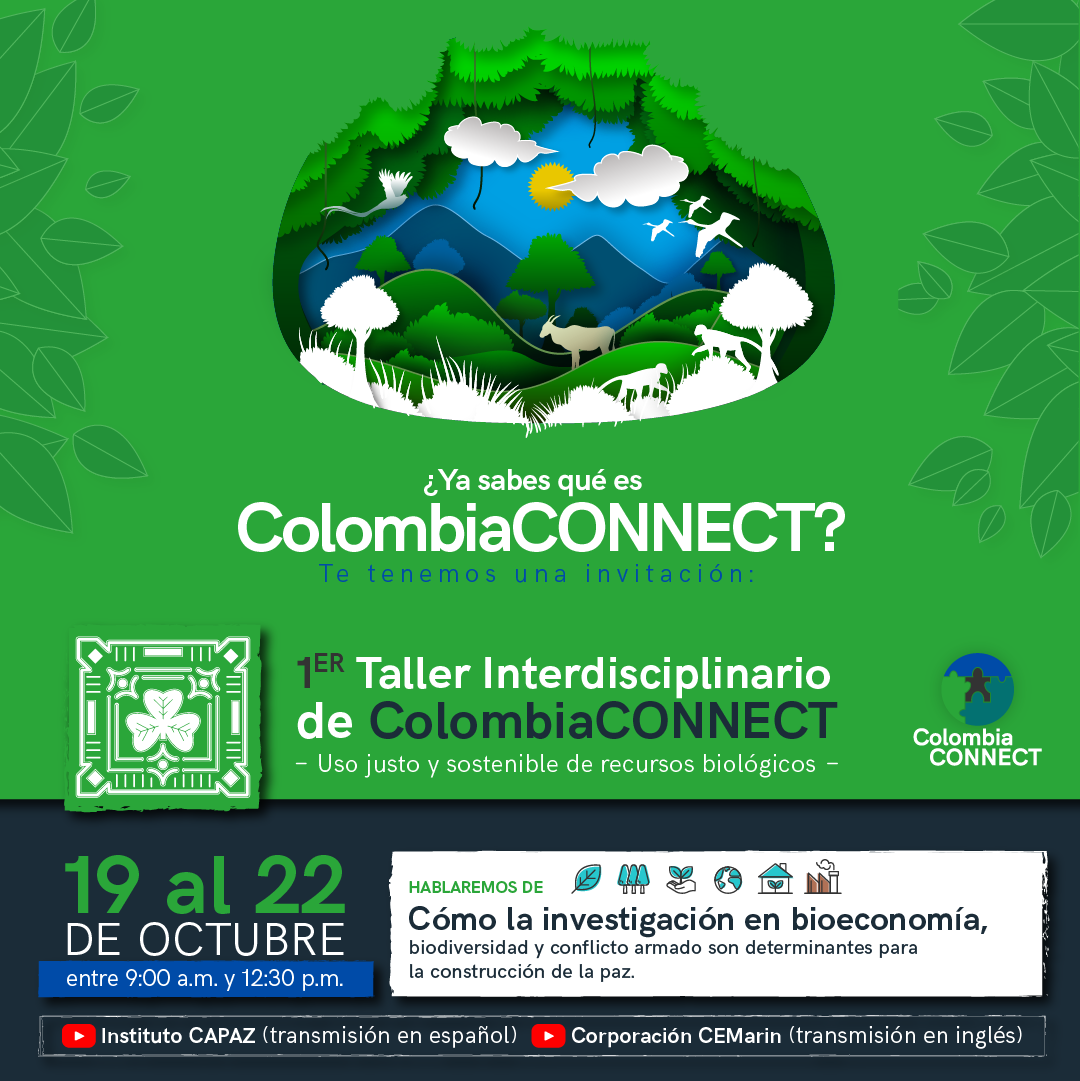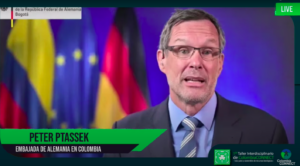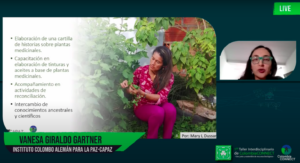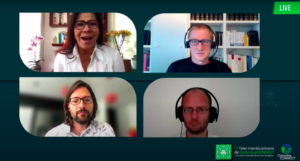
Revisit the first day of the ColombiaCONNECT Interdisciplinary Workshop
Fundamental issues were addressed during the transmission of day one of the First ColombiaCONNECT Interdisciplinary Workshop, which laid the groundwork for the discussions held over the next few days of the workshop. The questions discussed with the guest panelists and the webcast audience included the following: What is ColombiaCONNECT and what are its projects? What does the fair and sustainable use of resources mean? What challenges do we face when working with communities?
Revisit the event at (in English):
Key personalities of the German-Colombian cooperation network were presented in the first part of the day. Sophie von Knebel, the representative of the German Federal Ministry of Education and Research (BMBF), said that solutions to climate  change “can only have an impact if researchers around the world unite and collaborate with each other”. In this regard, Mr. Peter Ptassek, Ambassador of Colombia to Germany, added that “social conflicts cannot be resolved without addressing the climate crisis, and the only way to find solutions is by applying an interdisciplinary approach”. For their part, both Julián Humberto Ferro and Arturo Luna, representatives of the Colombian Ministry of Science, Technology, and Innovation, highlighted the role that Germany has played in supporting the government’s commitment to bioeconomy.
change “can only have an impact if researchers around the world unite and collaborate with each other”. In this regard, Mr. Peter Ptassek, Ambassador of Colombia to Germany, added that “social conflicts cannot be resolved without addressing the climate crisis, and the only way to find solutions is by applying an interdisciplinary approach”. For their part, both Julián Humberto Ferro and Arturo Luna, representatives of the Colombian Ministry of Science, Technology, and Innovation, highlighted the role that Germany has played in supporting the government’s commitment to bioeconomy.
Once these messages were delivered, participants were introduced to the network of institutions that make up the ColombiaCONNECT project. Ana María Aguirre, director of ColombiaCONNECT, explained the objectives of this interdisciplinary information and knowledge network, and mentioned the three fields included in her work: Biodiversity, bioeconomy, and peacebuilding. Subsequently, the projects being carried out under each of these components were presented.
 First, JLU’s Martin Tischner presented his Best Practice Project in which incentives are being designed for sustainable shrimp farming by feeding them with insects. Next, Jenny Leal from CEMarin presented her project on Participatory Aquaponics in Fishing Communities in Urabá. Meanwhile, CAPAZ’ Vanesa Giraldo explained that ColombiaCONNECT’s commitment for the post-conflict period is to work with communities that are involved in productive projects with medicinal plants, specifically with women’s communities where the armed conflict has had an impact on their territories. Finally, Rocío Acuña of the Humboldt Institute explained that the institute’s commitment as an organisation is to support economic diversification projects to improve quality of life among the Awá people of La Planada, Nariño.
First, JLU’s Martin Tischner presented his Best Practice Project in which incentives are being designed for sustainable shrimp farming by feeding them with insects. Next, Jenny Leal from CEMarin presented her project on Participatory Aquaponics in Fishing Communities in Urabá. Meanwhile, CAPAZ’ Vanesa Giraldo explained that ColombiaCONNECT’s commitment for the post-conflict period is to work with communities that are involved in productive projects with medicinal plants, specifically with women’s communities where the armed conflict has had an impact on their territories. Finally, Rocío Acuña of the Humboldt Institute explained that the institute’s commitment as an organisation is to support economic diversification projects to improve quality of life among the Awá people of La Planada, Nariño.
Roundtable
Participating in the roundtable discussion were CAPAZ Director Stefan Peters, Felipe Garcia, researcher at the Humboldt Institute, Tomas Wilke of JLU, and Andres Osorio of CEMarin.
The themes of the discussion revolved around the role of academia in ‘co-constructing’ with communities, how to foster dialogue with these communities, what the challenges are, and how to implement and create projects while taking into account these difficulties.
with these communities, what the challenges are, and how to implement and create projects while taking into account these difficulties.
Finally, Carsten Haub of EFTAS presented a platform they developed, which offers very useful data collection tools, which can collect geo-spatial metadata allowing easier visualisation and creation of maps and data collection, among others.
We hope you will join us at the workshop, where panellists will discuss environmental peace, environmental justice, and dialogues between knowledge.
Transmission link for day 2 (in English)
Transmission link for day 3 (in English)
Transmission link for day 4 (in English)
Find out more about the programme and the themes on the event’s website here.



